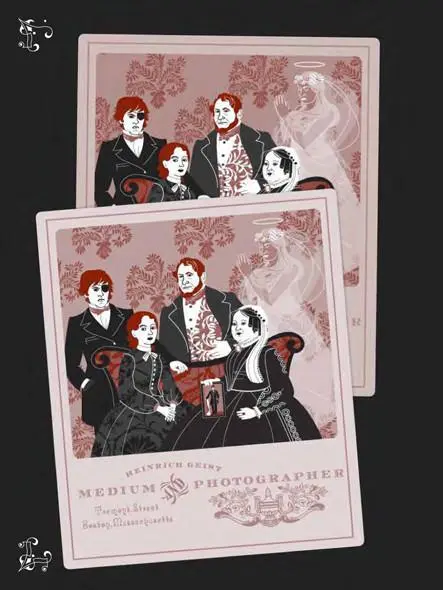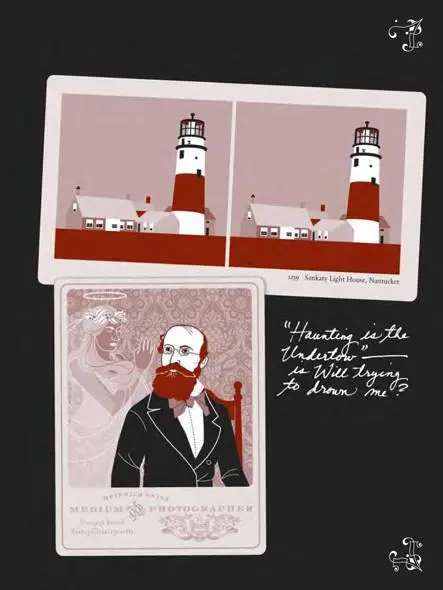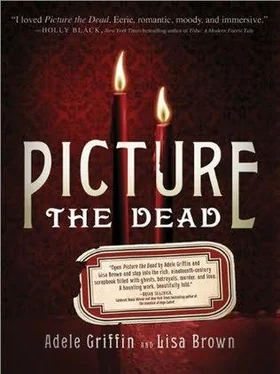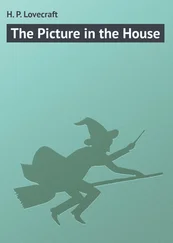Mavis lingers. Madame Broussard is widely thought to be the handsomest woman in Brookline, and Mavis craves a glimpse of her. “That so-said spiritualist is swindling Mister Pritchett worse than a snake oil salesman,” she declares as she stoops to peer through the keyhole.
“I suppose.” I won’t confide to Mavis the details of my nearfainting spell and how Will had come to me. That entire morning seems unreal, especially in light of Geist’s housemaid hoax.
Mavis straightens. “Don’t pay him a penny when you go over tomorrow oh, bon jer , Madame.”
For the door has opened and now the striking dressmaker stands before us. Her jet hair is accessorized by tortoiseshell pins, and her dress is the color of claret. In contrast, I feel as shabby as a dormouse.
Mavis is unabashedly delighted by Madame, and for a moment, I, too, feel a shy desire to dip a curtsy. And yet it wasn’t very long ago that Madame Broussard had presented me with gown sketches for the annual Boston Cultural Society Dance, an event that Will and I had attended to celebrate his entrance to Harvard, and where I’d taken my first sips of champagne and danced my first waltz. How can my very own memories feel as if they don’t belong to me? They seem so extravagant and carefree. Who was that pampered girl in French silk who believed in only happy endings?
Madame nods and moves to step past.
“Please, Madame,” I falter. “If you’re not late for another appointment, I’m in some need…” I pluck at my skirt, which tells the sad story.
Her fine, dark eyes are guarded. “ Mais , Mademoiselle Lovell, your aunt has made it clear to me that you won’t be fitted for anything new this season. When I asked, she gave me the impression that your present wardrobe is more than adequate.”
Though one look at my dress refutes this point. It’s hard to say who is more pained by the discomfit of the moment. “Yes, now I remember.” I hasten to fill the pause. “Excuse me. I’d forgotten that I’m having two dresses made over secondhand from Aunt.” I imagine Aunt Clara smirking from her chaise, and my face burns with shame and rage.
“Madame Pritchett has more than enough material to take in,” agrees Madame, too quickly. “So that is a fine solution. Très simple .”
I step back to let her pass.
She lingers a moment. “ Ma chère ,” she says. “My heart breaks for your tragedy. Your brother, and then Monsieur William… il est tout trop tragique .” The press of her hand to my cheek is more comfort than I have received from any of my kin. Her fingers stop to pick up the edge of my collar. “Such very delicate work.”
“It’s Miss Jennie did it herself,” Mavis bursts out. “She’s a grand talent with lace. She fashioned me a fancy collar, too, but I only wear it Sundays. I got a knack for mending, but Miss Jennie has such patience for the details.”
“Impressive,” says Madame, with a sincerity that makes me blush.
I accompany her to her carriage. Outside, Quinn strides along the garden wall. He is bundled into his overcoat and muffler, yet his face isn’t so obscured that I cannot see his lips move. Of the two brothers, Quinn had cut a finer figure in society, where his good looks and quick wit served him better than Will’s raw enthusiasm and tendency to speak his mind. But without a captive audience, Quinn is a lonely soul, and time has taught me that he never wants company on these garden walks.
The garden paths were Quinn’s retreats whenever he and his brother quarreled. Will, outspoken and fiery, never stayed at Pritchett House, but took his temper elsewhere, either into town or deep into the country, where I might find him skipping stones or rowing across Jamaica Pond, churning up its waters, exhausting himself.
In contrast, Quinn simply froze in place when he was angry. Housebound, he brooded in his room or haunted the grounds like a lost pup.
He is frozen still. Madame’s point of vision follows Quinn as he marches along, locked in battles from which his mind can’t escape.
“Poor boy,” she murmurs. “So the stories are true.”
“What do you mean?” I can hear my own voice strain.
Her glance at me is both sympathetic and faintly pitying.
And though I wish she wouldn’t, Madame continues to observe him through the window until her carriage rolls away.




I’m late for the next afternoon’s appointment. Geist is waiting in the foyer, and he greets me with coltish energy. Viviette, eyes averted, collects my damp cloak. I’m annoyed to see her. If I don’t know the difference between one of heaven’s own angels and an ordinary housemaid, then how easily might I be fooled again?
“You don’t have to be so coy,” I tell her. “I recognize your face.”
In answer, she stares up at me with eyes hard and dark as coal, and I realize there’s nothing shy about Viviette at all.
“Miss Lovell,” says Geist. “At last.”
“Please excuse my delay,” I say. “Ice on the tracks put the trains off schedule.”
Geist shrugs. “At least you are here in one piece. This way, please. There is something I want you to see.”
“No, I can’t stay,” I protest. “I only want to pay the balance and to collect the photograph for my uncle.”
“A minute, a minute.” Geist pinches hold of my forearm, ushering me down the hall and into the same sitting room where we’d gathered two days before. He points to his ornate French mantel clock, its face adorned with sturdy pink and gold cherubs.
“Behold!” His voice trumpets.
I peer closer. “Yes, I see that your clock is wrong. It is stopped at half past twelve, when it must be nearly…three o’clock?”
He harrumphs. “ Thirty two minutes past twelve. And ” He pivots me by both shoulders so that I’m staring into the opposite corner, up at the moon phases and dials of his grandfather clock.
“Thirty-two minutes past twelve,” I read.
“Precisely.”
“I’m not sure how this concerns ”
“ and I hadn’t noticed it, either, until you all had left. Think, Miss Lovell! Two days ago, at twelve thirty-two, in this very room, you experienced some sort of emotional chaos. It penetrated you so deeply, in fact, that you fainted.”
I turn from the clock. “You’re telling me that my fainting spell stopped time?”
“No, no, no.” Geist taps his fingertips together, urging my conclusion. “Twelve thirty-two. The very moment when William Pritchett made contact with you, yes?”
I freeze. “Sir, you are playing games with me,” I say. “You stopped these clocks yourself.”
“What?” He looks puzzled. “But why would I do that?”
“Why, because…because you know I took the Harding photograph. That I recognized your angel, Viviette, and you caught a change in my manner.” I rush on as his chicanery becomes clear to me. “Yes, you saw a change in me as soon as I reentered the room. You knew I’d seen the photograph. And now you’re scrabbling to make me a believer again.”
“A believer?” He looks baffled. “To what end?”
Читать дальше















